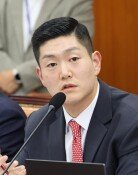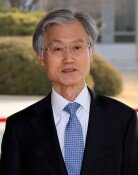Conservative Party Wins Narrow Parliamentary Majority
Conservative Party Wins Narrow Parliamentary Majority
Posted April. 10, 2008 16:22,
The conservative Grand National Party Wednesday secured a narrow majority of the 299 National Assembly seats in the general elections.
The party had forecast a landslide victory of 170 seats as indicated by network exit polls. As the day wore on, however, a considerable number of GNP candidates lost close races in the Gyeongsang provinces, though the party swept through the Seoul metropolitan area. The GNP performed worst in the Chungcheong region, winning one out of 24 up for grabs.
In the 2004 general elections, the Uri Party secured a parliamentary majority. No party, however, had done so in the four previous general elections since 1987, when the direct presidential election system was adopted.
Of 245 constituencies nationwide, the GNP won 153, followed by the liberal United Democratic Party with 81; the Liberty Forward Party 18; the Pro-Park Alliance 14; the progressive Democratic Labor Party three; the Renewal of Korea Party three; and independents with 25.
Fifty-four seats under the proportional representation system will also be assigned, with 22 of them to go to the GNP.
The GNP saw a landslide victory in the Seoul metropolitan area, which largely determines the fate of the general elections. The party took 111 constituencies or 45 percent, while its rival UDP won only in 20 districts in the capital area.
By region, the GNP dominated the Seoul metropolitan area, while the UDP secured a host of seats in the Jeolla region and North Chungcheong Province. The LFP won in Daejeon and South Chungcheong Province.
Though the GNP showed its strength in the Gyeongsang provinces, its home turf, independent candidates caused the party to take less than 50 of the 68 seats up for grabs in the area. In Gangwon Province, the GNP won three seats and the UDP two.
The GNPs Lee Jae-oh, Lee Bang-ho and Park Hyung-jun, the closest aides to President Lee Myung-bak, lost their respective districts. For the UDP, party leader Sohn Hak-kyu and his predecessor Chung Dong-young shared the same fate.
Former GNP Chairwoman Park Geun-hye became the first woman lawmaker to win four terms. FIFA Vice President and the largest shareholder of Hyundai Heavy Industries Chung Mong-joon, who changed his constituency from Ulsan to Seoul, won his sixth term as a lawmaker. Kim Mu-seong, who bolted from the GNP after failing to earn a nomination, won as an independent. Cho Sun-hyung of the LFP became the longest serving lawmaker by winning his seventh term.
Voter turnout was tentatively tallied at 46 percent, the lowest in the countrys history. The 2000 general elections had held the previous low of 57.2 percent.
The National Election Commission said, The 18th parliamentary elections ended at 6 p.m. with voter turnout hovering around 46 percent with 17,393,516 out of 37,796,035 registered voters casting their ballots.
By region, Jeju Province posted the highest turnout of 53 percent and Incheon the lowest of 42 percent. The figures in other regions were Seoul 45.7 percent; Busan 42.9 percent; Daegu 45 percent; Gwangju 42.5 percent; Daejeon 45.3 percent; Ulsan 45.8 percent; Gyeonggi Province 43.7 percent; Gangwon Province 51.5 percent; North Chungcheong Province 49.3 percent; South Chungcheong Province 48.1 percent; North Jeolla Province 47.5 percent; South Jeolla Province 49.9 percent; North Gyeongsang Province 53 percent; and South Gyeongsang Province 48.3 percent.
jkmas@donga.com mhpark@donga.com







